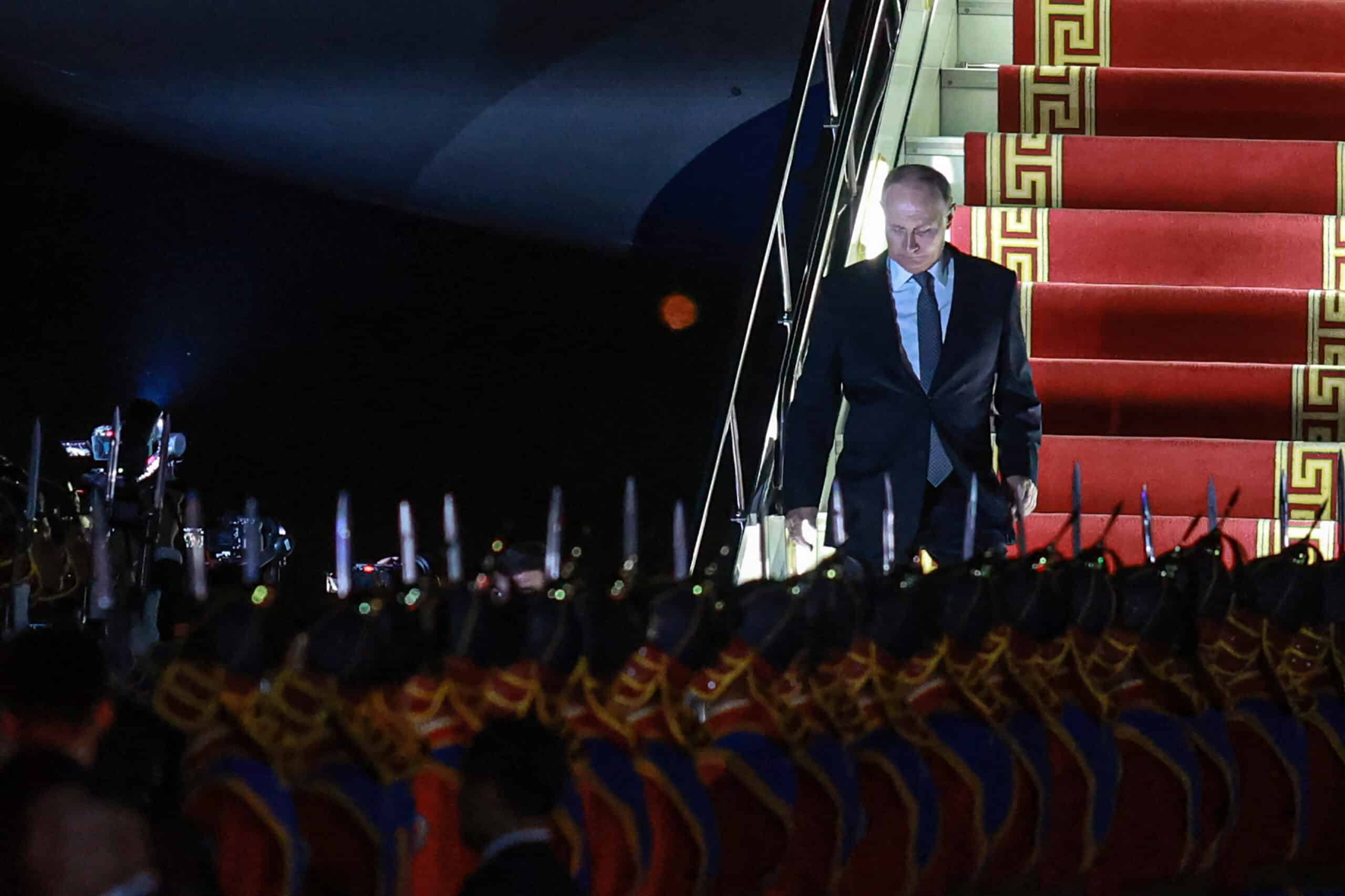
Russia’s President Vladimir Putin arrives at Buyant-Ukhaa International Airport in Mongolia’s capital Ulaanbaatar on September 2, 2024. Agence France-Presse
ULAANBAATAR, Mongolia — Russian President Vladimir Putin arrived in Mongolia on Monday, his first visit to a member state of the International Criminal Court (ICC) since it issued an arrest warrant for him last year.
Putin was welcomed by a guard of honor as he landed in the Mongolian capital Ulaanbaatar for the high-profile trip, seen as a show of defiance against the court, Kyiv, the West and rights groups that have all called for him to be detained.
The Russian leader is wanted by the Hague-based court for the alleged illegal deportation of Ukrainian children since his troops invaded the country in 2022.
READ: ICC judges issue arrest warrant against Putin over alleged war crimes
Ukraine has reacted to the trip with fury.
On Monday it accused Mongolia of “sharing responsibility” for Putin’s “war crimes” after authorities did not detain him at the airport.
Kyiv had urged Mongolia to execute the arrest warrant, while the ICC said last week all its members had an “obligation” to detain those sought by the court.
In practice there is little that can be done if Ulaanbaatar does not comply.
READ: Russia mocks ICC order vs Putin: No jurisdiction
The Kremlin said last week it was not concerned that Putin would be arrested.
Sandwiched between Russia and China, Mongolia was under Moscow’s sway during the Soviet era.
Since the Soviet collapse in 1991, it has sought to keep friendly relations with both the Kremlin and Beijing.
The country has not condemned Russia’s offensive in Ukraine and has abstained during votes on the conflict at the United Nations.
Mongolia ‘shares responsibility’
Ukrainian foreign ministry spokesman Georgiy Tykhyi called Mongolia’s failure to arrest Putin a “heavy blow” to the ICC’s legitimacy and said Kyiv would pressure for the country to be punished.
“Mongolia allowed the indicted criminal to escape justice, thereby sharing responsibility for his war crimes. We will work with partners to ensure that this has consequences for Ulaanbaatar,” he said in a post on social media.
The ICC issued an arrest warrant for Putin in March 2023.
It said there were “reasonable grounds to believe” that Putin “bears responsibility for the war crime of unlawful deportation” of Ukrainian children to Russia.
Kyiv says thousands of Ukrainian children were forcibly deported from orphanages and other state institutions after Russian forces took control of swathes of the country in its 2022 invasion.
People holding Ukranian national flags and a banner take part in a protest ahead of a visit by Russian President Vladimir Putin in Ulaanbaatar, Mongolia’s capital city on September 2, 2024. Agence France-Presse
Media investigations have found evidence of Ukrainian children being adopted by Russian families and having their names changed, prompting allegations Moscow is trying to scrub their Ukrainian identity.
Russia says it moved some children from areas close to the fighting for their own protection.
It has dismissed the warrant as having no consequence, but this trip to Mongolia marks Putin’s first to an ICC member in the 18 months since it was issued.
Last year he called off a visit to a BRICS summit in South Africa, another ICC member, after internal and external pressure on Pretoria to arrest the Russian leader should he attend.
‘Encourage Putin’
Past instances of ICC members failing to execute arrest warrants have had little consequence beyond verbal dressing-downs.
The court has no police of its own and relies on member states to execute its orders.
Amnesty International warned Monday that Mongolia’s failure to arrest Putin could further undermine the ICC’s legitimacy, while emboldening the ex-KGB spy, in power for almost a quarter of a century.
READ: But will Putin ever be arrested and put on trial?
“President Putin is a fugitive from justice,” Altantuya Batdorj, executive director of Amnesty International Mongolia, said in a statement.
“Any trip to an ICC member state that does not end in arrest will encourage President Putin’s current course of action and must be seen as part of a strategic effort to undermine the ICC’s work.”
Amid a backlash to the ICC after it issued an arrest warrant for Israeli Prime Minister Benjamin Netanyahu, Mongolia was among 93 countries that signed a letter stating “unwavering support” for the court “as an independent and impartial judicial institution”.
In that statement, issued in June, the signatories also called on all ICC members “to ensure full cooperation with the Court for it to carry out its important mandate of ensuring equal justice for all victims of genocide, war crimes, crimes against humanity and the crime of aggression.”

